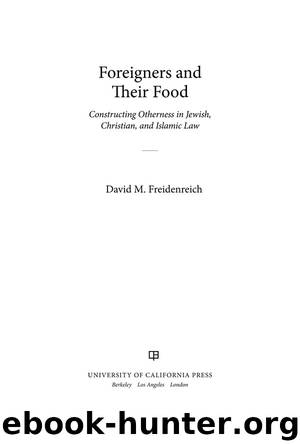Foreigners and Their Food by Freidenreich David M.;

Author:Freidenreich, David M.;
Language: eng
Format: epub
Publisher: University of California Press
Published: 2012-01-22T16:00:00+00:00
“GRAINS” AND AGAINST-THE-GRAIN
SCRIPTURAL INTERPRETATION
Shi‘i authorities are well aware that their prohibitions of nearly all foodstuffs associated with non-Muslims seem to contradict the evident meaning of the Qur’an’s declaration that “the food of those who were given the Book is permitted to you” (Q. 5.5). These authorities, moreover, recognize the importance of this verse in Sunni discourse about acts of animal slaughter and its potency in polemic against the more restrictive Shi‘i norms. For these reasons, Shi‘is make a point of reconciling Qur’an 5.5 with their conceptions of religious foreigners and proper dietary practices. The ability of Shi‘is to effectively redefine the meaning of this verse reflects the fact that Shi‘i ideas, shaped by the Qur’an, also shape the meaning of the Qur’an itself within the Shi‘i community. The dialectical nature of the relationship between the Qur’an and Shi‘i thought exemplifies Wilfred Cantwell Smith’s definition of “scripture” as “a relation between a people and a text.” More broadly, Smith observes, “at issue is the relation between a people and the universe, in light of their perception of a given text.”31 Shi‘i perceptions of Qur’anic discourse about the food of foreigners, reinforced through the use of Qur’anic prooftexts in anti-Sunni polemics, reflect and reinforce the manner in which Shi‘is imagine the place of their own community within the broader social universe.
Shi‘i authorities may disregard the evident meaning of Qur’an 5.5, but their ideas regarding non-Muslim acts of animal slaughter are most certainly in keeping with other Qur’anic statements. Recall that the Qur’an itself equates Scripturists and idolaters in certain contexts. Shi‘i discourse regarding animal slaughter, moreover, orients itself toward a pair of verses in Sūrat al-an‘ām: “Eat from that over which God’s name was mentioned . . . and do not eat from that over which the name of God has not been mentioned” (6.118, 121). Even the earliest Shi‘i authorities, who distinguish Scripturists from Magians, emphasize the importance of these norms: the Majmū‘ al-fiqh, for example, cites ‘Alī as specifying that meat prepared by Jewish, Christian, or Muslim butchers is only permitted for consumption if the butcher invoked God. The authorities we encountered above who permit the meat of properly slaughtered animals irrespective of the butcher’s religious identity support their stance by appeal to 6.118, while those who regard all meat prepared by non-Muslims as unfit for consumption often cite verse 121. Whether permissive or restrictive, norms based on these verses need not distinguish among types of foreigners. Indeed, we will see in chapter 13 that Sunni authorities struggle to preserve such a distinction while reconciling the permissive 5.5 with restrictive verses like 6.121.
For those who believe that the requirement of a proper invocation is paramount and that Jewish and Christian butchers either cannot be trusted to perform this vital task or are incapable of doing so effectively, the Qur’an’s permission of “the food of those who were given the Book” cannot possibly refer to meat. Thus the Imāmī exegete ‘Alī b. Ibrāhīm al-Qummī (fl. ca. 900) explains that “by ‘their
Download
This site does not store any files on its server. We only index and link to content provided by other sites. Please contact the content providers to delete copyright contents if any and email us, we'll remove relevant links or contents immediately.
| Africa | Americas |
| Arctic & Antarctica | Asia |
| Australia & Oceania | Europe |
| Middle East | Russia |
| United States | World |
| Ancient Civilizations | Military |
| Historical Study & Educational Resources |
Cecilia; Or, Memoirs of an Heiress — Volume 1 by Fanny Burney(32544)
Cecilia; Or, Memoirs of an Heiress — Volume 2 by Fanny Burney(31939)
Cecilia; Or, Memoirs of an Heiress — Volume 3 by Fanny Burney(31928)
The Secret History by Donna Tartt(19039)
Sapiens: A Brief History of Humankind by Yuval Noah Harari(14361)
Leonardo da Vinci by Walter Isaacson(13315)
The Radium Girls by Kate Moore(12013)
Sapiens by Yuval Noah Harari(5363)
How Democracies Die by Steven Levitsky & Daniel Ziblatt(5211)
The Wind in My Hair by Masih Alinejad(5085)
Homo Deus: A Brief History of Tomorrow by Yuval Noah Harari(4901)
Endurance: Shackleton's Incredible Voyage by Alfred Lansing(4764)
Man's Search for Meaning by Viktor Frankl(4575)
The Silk Roads by Peter Frankopan(4525)
Millionaire: The Philanderer, Gambler, and Duelist Who Invented Modern Finance by Janet Gleeson(4462)
The Rape of Nanking by Iris Chang(4201)
Joan of Arc by Mary Gordon(4098)
The Motorcycle Diaries by Ernesto Che Guevara(4089)
Stalin by Stephen Kotkin(3956)
